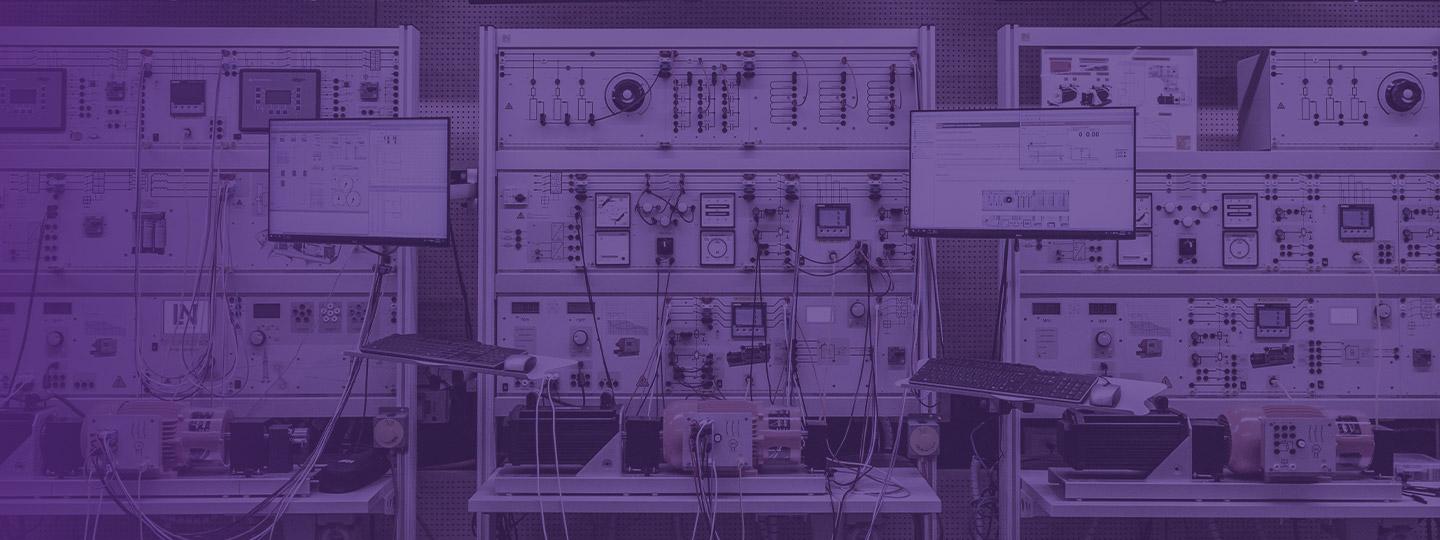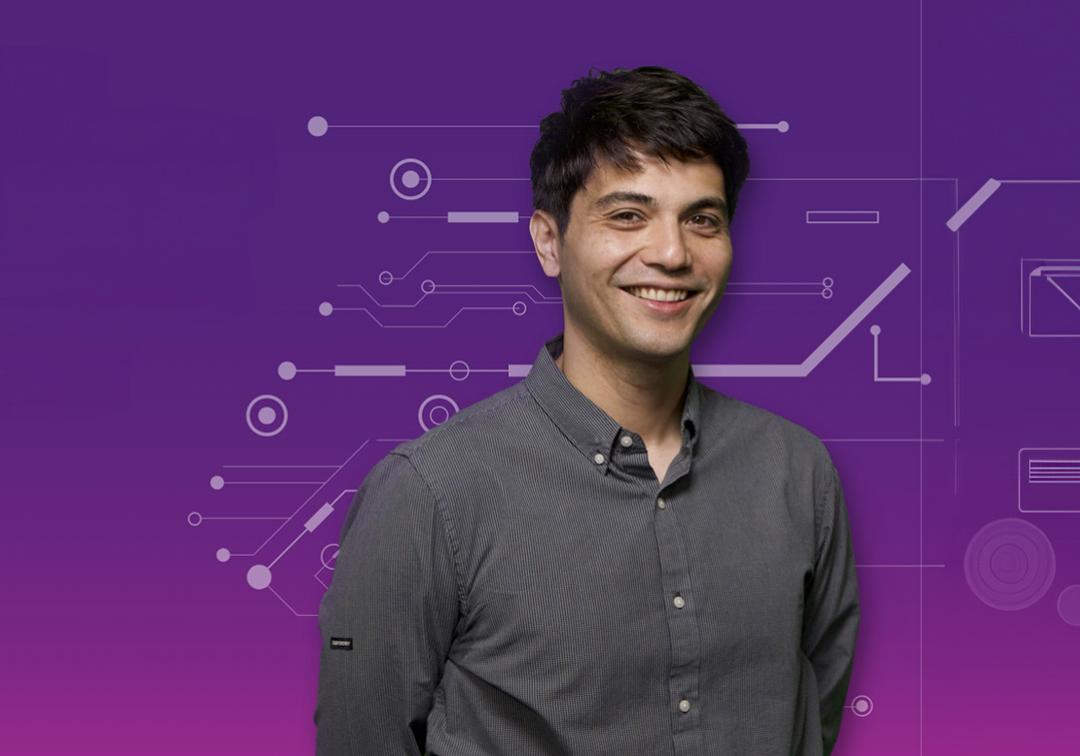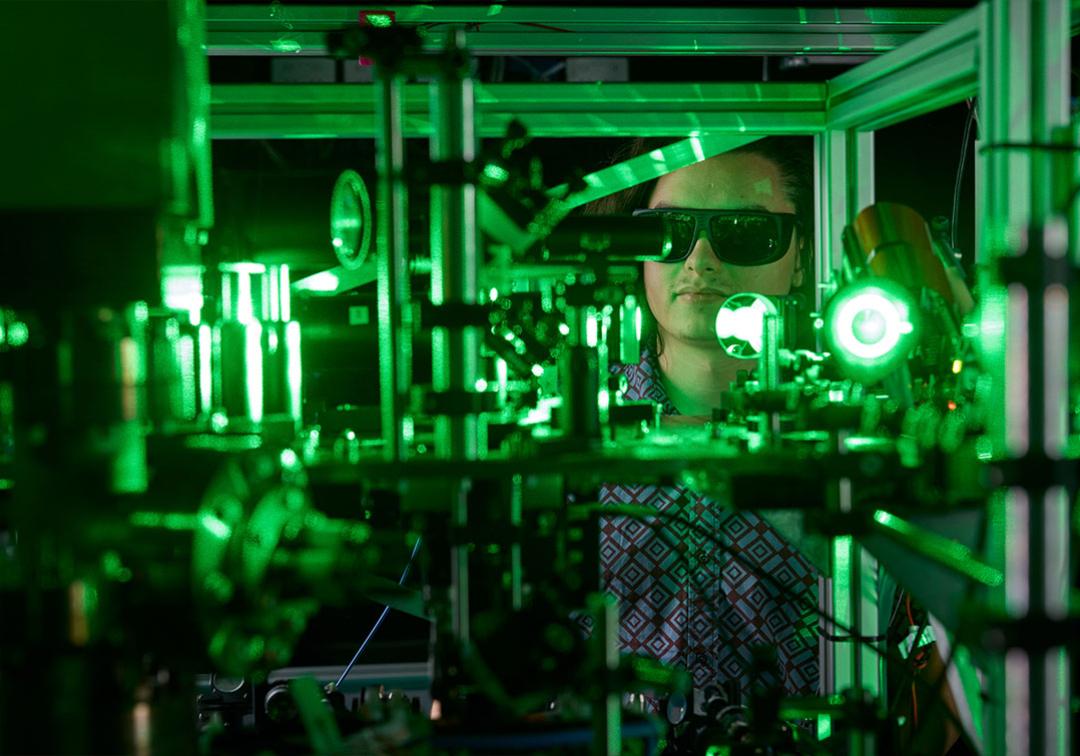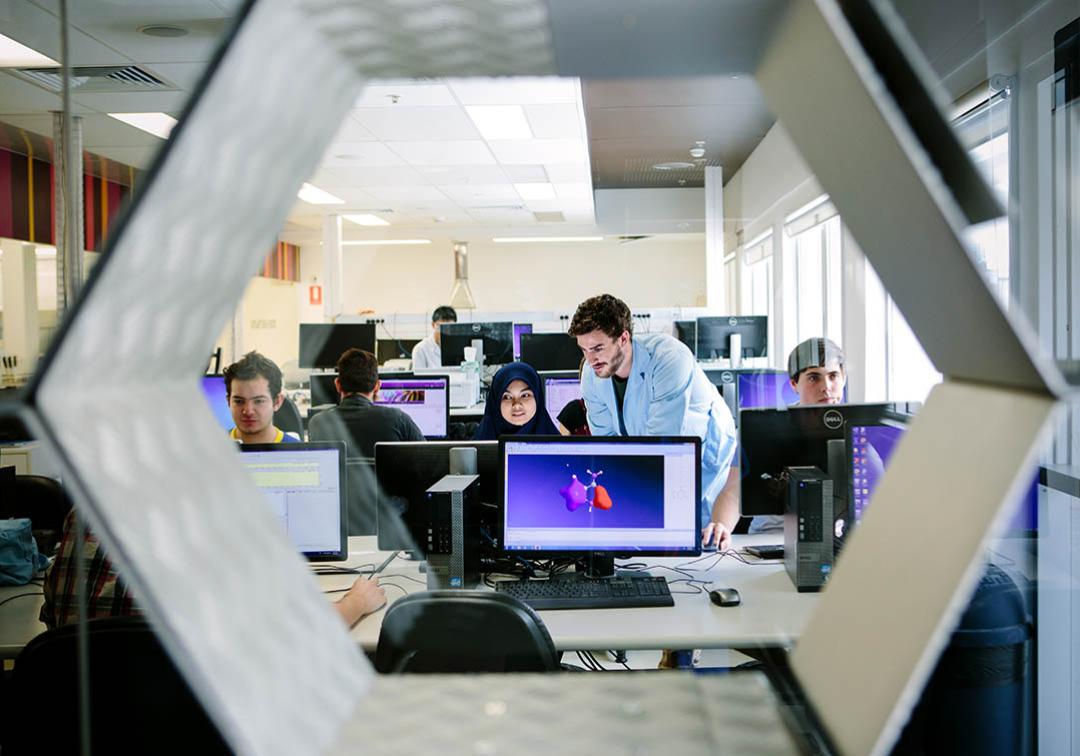
Bachelors of Mathematics / Computer Science
Overview
Prepare yourself to research and develop the next big breakthroughs in technology and science with this dual degree program.
This four-year dual program will provide you with a focused background in computer science, and in-depth knowledge and expertise you'll gain through the mathematics program.
Computer science combines the theoretical studies of algorithms and data structures with practical training in implementing them in hardware and software systems. Skills learnt in this program are used in fields ranging from bioinformatics to digital humanities.
You'll develop the strong analytical, logical and development expertise necessary to advance computing and its applications. You can specialise in cyber security, data science, machine learning, programming languages or scientific computing.
In the mathematics component, you'll develop a comprehensive specialised knowledge in one field of mathematics or a high level of sophistication in the applications of mathematics generally.
Modern computation, advances in scientific technology and the increasing production of data have all increased how mathematics is applied beyond traditional areas, opening up your career opportunities to include fields such as finance, economics, information technology and molecular biology.
There is increasing recognition that graduates with high-level quantitative and analytical skills will play a key role at the forefront of new developments in these and other fields.
Program highlights
- Graduate with skills that are in high demand from some of the world's largest corporations, such as Apple, Google, Oracle and Microsoft.
- Join a school with more than 50 years of experience teaching computer science that's consistently ranked in the top 100 worldwide.
- Choose from over 60 individual mathematics and statistics courses – more than any other Queensland university.
Majors
Tailor your studies to suit your goals. This program offers these options:
- Applied Mathematics
- Bioinformatics
- Computational Science
- Cyber Security
How you'll learn
Your learning experiences are designed to best suit the learning outcomes of the courses you choose.
- Lectures
- Tutorials
- Overseas study
- Research experience
- Laboratory work
- Workshops
What you'll study
At UQ, degrees are called 'programs' and subjects are called 'courses'.
Career possibilities
Our programs prepare you for your first job and beyond. Depending on which major you choose, here are some of the careers you could be on your way to:
- Quantitative researcher
- Cyber security analyst
- Data analyst
- Quantitative analyst
- Software developer
- Quantitative researcher
- Technical business analyst
- Applied statistician
- Database developer
Graduate salary
Science and mathematics (undergraduate)
compared.edu.au
Graduate salary
Computing and information systems (undergraduate)
compared.edu.au
Next steps after graduation
82.5% of graduates are in full-time employment (Computer and Information Systems Quality Indicators for Learning and Teaching, 2019).
All of Australia's top five emerging jobs feature automation or Artificial Intelligence (AI) skills (LinkedIn 2020 Emerging Jobs Report Australia).
Demand for technology workers will grow by 100,000 between 2018 and 2024 (ACS Australia's Digital Pulse 2019).
Australia’s technology workforce has seen average trend growth of 2.5% per annum between 2011 and 2018, outpacing growth in the overall Australian labour market of 1.7% over this period. (Australia's Digital Pulse 2019).
Events
See all events
22 May
UQ's Sustainable Energy programs, Q&A webinars
Stories
See all stories
Study tips
3 pathways to engineering and computing at UQ
Stories
See all stories
UQ people
Meet the expert: exploring computer science with Dr Paul Vrbik
Entry requirements
Prerequisites
Specialist Mathematics (Units 3 & 4, C) is recommended. Students studying Specialist Mathematics will have increased flexibility in their studies.
Prerequisites
Specialist Mathematics (Units 3 & 4, C) is recommended. Students studying Specialist Mathematics will have increased flexibility in their studies.
Minimum entry score
Check the minimum entry scores for the individual programs. You must meet the higher score.
Entry score threshold
| ATAR / Rank | IB |
|---|---|
| 92 | 35.25 |
These are the lowest adjusted scores we made an offer to in Semester 1, 2024. Entry scores are based on the most recent Semester 1 intake and are updated in April each year. Meeting the entry score threshold doesn't guarantee admission.
Guarantee your place at UQ: If you meet our guaranteed minimum ATAR you could secure an offer for your preferred program.
English language requirements
IELTS overall 6.5; reading 6; writing 6; speaking 6; listening 6. For other English Language Proficiency Tests and Scores approved for UQ
TOEFL iBT (including Paper Edition) - Overall 87, listening 19, reading 19, writing 21 and speaking 19.
PTE Academic - Overall Score of 64 and 60 in all sub bands.
BE - A minimum overall grade of 4 plus a minimum grade of C in all macro skills.
CES - Overall 176 and 169 in all sub bands.
OET is not accepted.
There are other ways to meet the English language requirements. For some programs, additional conditions apply.
Student visas
International students who are accepted into full-time study in the Bachelors of Mathematics / Computer Science are eligible to apply for an Australian student visa (subclass 500).
There are a number of requirements you must satisfy before a visa is granted, including the Genuine Student (GS) requirement.
Entry score range
This table shows the range of entry scores for recent secondary students offered a place in the B Mathematics/BComputerScience for Semester 1, 2024
| Without adjustments | With adjustments | |
|---|---|---|
| Highest | 99.95 | 99.95 |
| Median | 97.6 | 99.6 |
| Lowest | 88.15 | 93.15 |
Need help meeting the entry requirements?
Majors and minors
Majors
Tailor your studies to suit your goals. This program offers these options:
Study applied mathematics and learn how advanced mathematical methods are used to develop practical solutions to a variety of real-world problems.
Develop your critical thinking skills and learn advanced mathematical techniques for approaching problems in a logical, analytical and creative manner.
Build your foundational knowledge in core topics such as applied mathematical analysis, mathematical modelling and numerical methods used in computer programming.
You'll then have the opportunity to apply your expertise in areas of interest such as natural resources and environmental modelling, or biological science.
You may also choose to combine your major with a minor in bioinformatics, computational science, computer science, physics or statistics.
This major will prepare you for a diverse range of career opportunities in sectors such as financial services, engineering, technology and sciences.
By studying cyber security, you'll learn the fundamental processes and practices to protect computing systems from attack, damage or unauthorised access.
You'll study secure programming techniques and ethical hacking to safeguard individuals, businesses and governments against cybercrime, and you'll graduate with highly valued and employable skills.
Career paths can lead to roles such as cyber security analyst, cyber systems engineer or information security officer.
Join a growing industry
- Cyber security specialist was the #2 emerging job of 2020 (LinkedIn 2020 Emerging Jobs Report).
- By 2026, Australia will need 18,000 more cyber security workers.
- Australia’s external spending on cyber security products and services grew by 8 per cent in 2018 to $3.9 billion (Australian Cyber Security Growth Network).
This major applies scientific information and decision-making to business management. You'll also learn the skills needed to analyse large and complex data sets and to make effective decisions.
This major will prepare you to work in a range of roles in financial services, technology, engineering, science and research.
You may choose to combine your major with a minor in bioinformatics, computational science, physics or statistics.
You'll learn comprehensive and fundamental techniques for end-to-end processing that transforms data into information, and prepare to become one of the new breed of data science professionals.
This major will prepare you for a career in government departments, consultancy or private sector organisations.
Join a growing industry
- The rise of big data means data scientists are now some of the most in-demand professionals in the world.
- Data scientist was the #7 top emerging job of 2020 (LinkedIn 2020 Emerging Jobs Report).
These algorithms allow computers to do things like automatically identify and harness useful data to help decision-making, find hidden insights without being explicitly programmed where to look, and predict outcomes to help authorities design effective policies.
You'll graduate with skills at the forefront of this massive growth area, as society looks for automated solutions to enhance business and our lives through the use of computing systems and data.
These skills can be applied in government departments, consultancy or private sector organisations.
Join a growing industry
- Artificial intelligence specialist was the #1 emerging job of 2020 (LinkedIn 2020 Emerging Jobs Report).
- AI could contribute up to $15.7 trillion to the global economy in 2030 (PwC research).
- New AI technologies will require highly skilled workers who can develop and maintain complex systems and applications.
It also examines the mathematical understanding that underpins a broad range of contemporary sciences, including statistical mechanics, relativity and quantum theory. You'll learn how to understand and describe nature at its most fundamental levels.
This major not only prepares you for research in mathematical physics and related disciplines, but also fosters creativity and develops high-level skills in critical and analytical thinking, which are paramount in problem-solving.
You may choose to combine your major with a minor in bioinformatics, computational science, physics or statistics.
Covering the different paradigms of programming, this major focuses on the design of computer languages that can be easily used to create programs.
You will study the craft and science of programming, and graduate with the skills to enable the construction of effective programming languages and reliable software.
Career paths often lead to roles in government departments, consultancy or private sector organisations.
Programming opens doors beyond tech
- Programmers write software that can be used to create websites, build computer networks, help doctors treat patients, or even drive a car.
- Half of all programming roles are in finance, manufacturing, health care, and other sectors outside of the technology industry.
- Coding skills can take you places: data analytics, scientists, engineers and designers all use coding.
You'll develop high-level skills in critical, analytical and abstract thinking, and study frameworks for deeper understanding of other areas of mathematics, such as applied mathematics, mathematical physics and statistics.
You'll also have the opportunity to acquire a solid grounding in the key areas of pure mathematics, as well as opportunities to undertake focused study in advanced courses.
You may choose to combine your major with a minor in bioinformatics, computational science, physics or statistics.
Computers hold the key for fast and efficient analysis of complex scientific problems. However, computers are digital systems, requiring discrete inputs and outputs, while mathematical analysis often relies on continuous functions. Therefore, careful approximations are necessary to enable computers to analyse complex mathematical functions.
You'll graduate with skills used in various scientific endeavours, including in hospitals and university medical research, and big pharmaceutical and petrochemical companies across the public and private sectors.
Join a growing industry
- Help solve the complex scientific problems of the future using mathematical analysis.
- The digital technology sector is one of the fastest growing parts of Australia’s economy.
- Data engineer was the #8 emerging job of 2020 (LinkedIn 2020 Emerging Jobs Report).
In this major, we combine theory with practical experience to expand your critical thinking, enhance your analytical capabilities and develop your technical skills.
You'll discover how statistics are used to help solve real-world problems, such as improving medical treatments through data-driven experimental design, or using meteorological and spatial data to assess drought conditions in local communities.
You'll learn and apply statistical techniques to analyse and interpret complex data, and transform it into meaningful insights.
Statisticians and data analysts are in high demand across business, industry, research and government to forecast, analyse and solve a variety of complex issues.
Minors
Tailor your studies to suit your goals. This program offers these options:
Gain specialised knowledge in statistics, data management, computer programming, genomics and molecular biology.
You’ll apply your scientific expertise and technical skills to translate complex biological data into meaningful information. Your insights may lead to new innovations or discoveries.
Studying bioinformatics will prepare you for a wide range of opportunities in scientific research organisations, universities, government departments, and the biotechnology or pharmaceutical industries.
Recent advances in technology give scientists the ability to collect and process more data than ever before.
Computational science combines fundamental principles from computer science, mathematics and statistics to solve scientific problems across any specialist field.
Develop your skills in computational thinking and apply computational problem-solving strategies to design algorithms for collecting, processing and analysing vast amounts of data from various sources.
Apply your programming skills to construct large-scale mathematical models and simulations to analyse and interpret real-world data and generate meaningful insights.
You’ll learn to create a range of data visualisations and graphics to communicate your findings to scientific and non-scientific audiences.
Skills in computational science are essential for any roles where computational techniques are required for problem-solving, forecasting, data analysis or data visualisation.
Led by internationally recognised researchers, you’ll study the laws of physics and explore how these principles are applied in our everyday life – from understanding the nature of time to developing new technologies.
You'll be able to combine your scientific and mathematical knowledge with skills in computer programming and statistics to understand theories relating to quantum mechanics, biophotonics, astronomy or astrophysics. Or apply your knowledge to develop advanced materials, electronic and optical devices.
Your high-level technical, analytical and problem-solving skills will lead you to a wide range of rewarding opportunities in sectors such as education, finance, engineering, computing and management.
Alternatively, continue into a higher degree by research to uncover new scientific knowledge or apply your findings to develop new devices, products or processes.
In this minor, we combine theory with practical experience to expand your critical thinking, enhance your analytical capabilities and develop your technical skills.
You'll discover how statistics are used to help solve real-world problems, such as improving medical treatments through data-driven experimental design, or using meteorological and spatial data to assess drought conditions in local communities.
You'll learn and apply statistical techniques to analyse and interpret complex data, and transform it into meaningful insights.
Statisticians and data analysts are in high demand across business, industry, research and government to forecast, analyse and solve a variety of complex issues.
Majors
Tailor your studies to suit your goals. This program offers these options:
Study applied mathematics and learn how advanced mathematical methods are used to develop practical solutions to a variety of real-world problems.
Develop your critical thinking skills and learn advanced mathematical techniques for approaching problems in a logical, analytical and creative manner.
Build your foundational knowledge in core topics such as applied mathematical analysis, mathematical modelling and numerical methods used in computer programming.
You'll then have the opportunity to apply your expertise in areas of interest such as natural resources and environmental modelling, or biological science.
You may also choose to combine your major with a minor in bioinformatics, computational science, computer science, physics or statistics.
This major will prepare you for a diverse range of career opportunities in sectors such as financial services, engineering, technology and sciences.
By studying cyber security, you'll learn the fundamental processes and practices to protect computing systems from attack, damage or unauthorised access.
You'll study secure programming techniques and ethical hacking to safeguard individuals, businesses and governments against cybercrime, and you'll graduate with highly valued and employable skills.
Career paths can lead to roles such as cyber security analyst, cyber systems engineer or information security officer.
Join a growing industry
- Cyber security specialist was the #2 emerging job of 2020 (LinkedIn 2020 Emerging Jobs Report).
- By 2026, Australia will need 18,000 more cyber security workers.
- Australia’s external spending on cyber security products and services grew by 8 per cent in 2018 to $3.9 billion (Australian Cyber Security Growth Network).
This major applies scientific information and decision-making to business management. You'll also learn the skills needed to analyse large and complex data sets and to make effective decisions.
This major will prepare you to work in a range of roles in financial services, technology, engineering, science and research.
You may choose to combine your major with a minor in bioinformatics, computational science, physics or statistics.
You'll learn comprehensive and fundamental techniques for end-to-end processing that transforms data into information, and prepare to become one of the new breed of data science professionals.
This major will prepare you for a career in government departments, consultancy or private sector organisations.
Join a growing industry
- The rise of big data means data scientists are now some of the most in-demand professionals in the world.
- Data scientist was the #7 top emerging job of 2020 (LinkedIn 2020 Emerging Jobs Report).
These algorithms allow computers to do things like automatically identify and harness useful data to help decision-making, find hidden insights without being explicitly programmed where to look, and predict outcomes to help authorities design effective policies.
You'll graduate with skills at the forefront of this massive growth area, as society looks for automated solutions to enhance business and our lives through the use of computing systems and data.
These skills can be applied in government departments, consultancy or private sector organisations.
Join a growing industry
- Artificial intelligence specialist was the #1 emerging job of 2020 (LinkedIn 2020 Emerging Jobs Report).
- AI could contribute up to $15.7 trillion to the global economy in 2030 (PwC research).
- New AI technologies will require highly skilled workers who can develop and maintain complex systems and applications.
It also examines the mathematical understanding that underpins a broad range of contemporary sciences, including statistical mechanics, relativity and quantum theory. You'll learn how to understand and describe nature at its most fundamental levels.
This major not only prepares you for research in mathematical physics and related disciplines, but also fosters creativity and develops high-level skills in critical and analytical thinking, which are paramount in problem-solving.
You may choose to combine your major with a minor in bioinformatics, computational science, physics or statistics.
Covering the different paradigms of programming, this major focuses on the design of computer languages that can be easily used to create programs.
You will study the craft and science of programming, and graduate with the skills to enable the construction of effective programming languages and reliable software.
Career paths often lead to roles in government departments, consultancy or private sector organisations.
Programming opens doors beyond tech
- Programmers write software that can be used to create websites, build computer networks, help doctors treat patients, or even drive a car.
- Half of all programming roles are in finance, manufacturing, health care, and other sectors outside of the technology industry.
- Coding skills can take you places: data analytics, scientists, engineers and designers all use coding.
You'll develop high-level skills in critical, analytical and abstract thinking, and study frameworks for deeper understanding of other areas of mathematics, such as applied mathematics, mathematical physics and statistics.
You'll also have the opportunity to acquire a solid grounding in the key areas of pure mathematics, as well as opportunities to undertake focused study in advanced courses.
You may choose to combine your major with a minor in bioinformatics, computational science, physics or statistics.
Computers hold the key for fast and efficient analysis of complex scientific problems. However, computers are digital systems, requiring discrete inputs and outputs, while mathematical analysis often relies on continuous functions. Therefore, careful approximations are necessary to enable computers to analyse complex mathematical functions.
You'll graduate with skills used in various scientific endeavours, including in hospitals and university medical research, and big pharmaceutical and petrochemical companies across the public and private sectors.
Join a growing industry
- Help solve the complex scientific problems of the future using mathematical analysis.
- The digital technology sector is one of the fastest growing parts of Australia’s economy.
- Data engineer was the #8 emerging job of 2020 (LinkedIn 2020 Emerging Jobs Report).
In this major, we combine theory with practical experience to expand your critical thinking, enhance your analytical capabilities and develop your technical skills.
You'll discover how statistics are used to help solve real-world problems, such as improving medical treatments through data-driven experimental design, or using meteorological and spatial data to assess drought conditions in local communities.
You'll learn and apply statistical techniques to analyse and interpret complex data, and transform it into meaningful insights.
Statisticians and data analysts are in high demand across business, industry, research and government to forecast, analyse and solve a variety of complex issues.
Minors
Tailor your studies to suit your goals. This program offers these options:
Gain specialised knowledge in statistics, data management, computer programming, genomics and molecular biology.
You’ll apply your scientific expertise and technical skills to translate complex biological data into meaningful information. Your insights may lead to new innovations or discoveries.
Studying bioinformatics will prepare you for a wide range of opportunities in scientific research organisations, universities, government departments, and the biotechnology or pharmaceutical industries.
Recent advances in technology give scientists the ability to collect and process more data than ever before.
Computational science combines fundamental principles from computer science, mathematics and statistics to solve scientific problems across any specialist field.
Develop your skills in computational thinking and apply computational problem-solving strategies to design algorithms for collecting, processing and analysing vast amounts of data from various sources.
Apply your programming skills to construct large-scale mathematical models and simulations to analyse and interpret real-world data and generate meaningful insights.
You’ll learn to create a range of data visualisations and graphics to communicate your findings to scientific and non-scientific audiences.
Skills in computational science are essential for any roles where computational techniques are required for problem-solving, forecasting, data analysis or data visualisation.
Led by internationally recognised researchers, you’ll study the laws of physics and explore how these principles are applied in our everyday life – from understanding the nature of time to developing new technologies.
You'll be able to combine your scientific and mathematical knowledge with skills in computer programming and statistics to understand theories relating to quantum mechanics, biophotonics, astronomy or astrophysics. Or apply your knowledge to develop advanced materials, electronic and optical devices.
Your high-level technical, analytical and problem-solving skills will lead you to a wide range of rewarding opportunities in sectors such as education, finance, engineering, computing and management.
Alternatively, continue into a higher degree by research to uncover new scientific knowledge or apply your findings to develop new devices, products or processes.
In this minor, we combine theory with practical experience to expand your critical thinking, enhance your analytical capabilities and develop your technical skills.
You'll discover how statistics are used to help solve real-world problems, such as improving medical treatments through data-driven experimental design, or using meteorological and spatial data to assess drought conditions in local communities.
You'll learn and apply statistical techniques to analyse and interpret complex data, and transform it into meaningful insights.
Statisticians and data analysts are in high demand across business, industry, research and government to forecast, analyse and solve a variety of complex issues.
Fees and Scholarships
Indicative annual fee
Approximate yearly cost of tuition (16 units). Your fees will vary according to your selected courses and study load. Fees are reviewed each year and may increase.
$6,709
2024
$6,709
2024
Approximate yearly cost of tuition (16 units). Your fees will vary according to your study load. Fees are reviewed each year and may increase.
AUD $50,440
2024
AUD $50,440
2024
Government assistance
Financial aid
As an international student, you might be eligible for financial aid – either from your home country, or from the Australian Government.
HECS-HELP
Domestic places in the Bachelors of Mathematics / Computer Science are Commonwealth Supported. This means the cost of your education is shared between you and the Australian Government.
Instead of tuition fees, Commonwealth Supported students pay what are called student contribution amounts.
HECS-HELP is an Australian Government loan scheme to assist eligible students with the cost of their student contribution amounts.
Centrelink support
The Australian Government offers a number of income-support payments to eligible Australian university students.
Scholarships
You may be eligible for more than 100 scholarships, including:
How to apply
Applying online
If your senior schooling is from outside Australia, you can submit your application to UQ. Or, if you prefer, you can use an approved UQ agent in your country.
The program code for the Bachelors of Mathematics / Computer Science is 2497.
Find out more about applying for undergraduate study
If your senior schooling is from Australia
Submit your application to the Queensland Tertiary Admissions Centre if you're an international student who is currently studying:
- Australian Year 12 (in Australia or another country), or
- the International Baccalaureate in Australia.
The QTAC code for the Bachelors of Mathematics / Computer Science is 714421.
Applying through QTAC
All domestic applications should be submitted to the Queensland Tertiary Admissions Centre (QTAC).
The QTAC code for the Bachelors of Mathematics / Computer Science is 714421.
Important dates
If you’re studying Year 12 in Australia, go to the QTAC website to check the closing date for this program.
If you’re applying to UQ, the closing date for this program is:
- To commence study in semester 2 - May 31 of the year of commencement.
- To commence study in semester 1 - November 30 of the previous year.
To learn more about UQ dates, including semester start dates, view the Academic Calendar.
Important dates
To check the closing date for this program, go to the QTAC website.
To learn more about UQ dates, including semester start dates, view the Academic Calendar.
Admissions schemes
Applying to university can be both exciting and daunting, which is why we’ve tried to make the process as simple as we can.
We have several schemes in place to improve your chances of getting a place at UQ.
Pathway options
A rank or score doesn’t determine your potential.
If you're not offered a place in your first-choice program – or if you don't meet the entry requirements – you still have a number of options.
Aboriginal and Torres Strait Islander applicants
For support with applying – or if you have any questions about university life – get in touch with our Aboriginal and Torres Strait Islander Studies Unit.
Explore other programs
Express yourself. And your interest.
They say choosing a degree is hard, which is why we've made it easy. Register your interest and we'll send you everything you need to know about applying to UQ.





